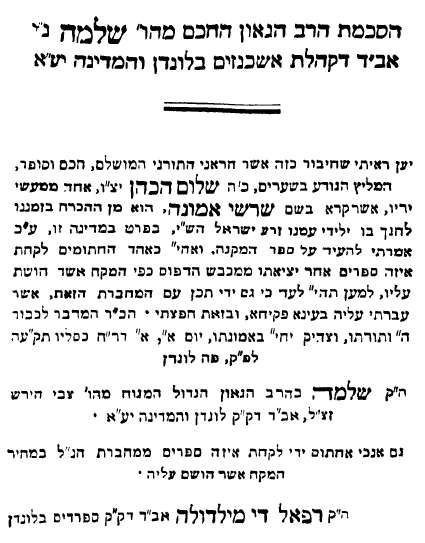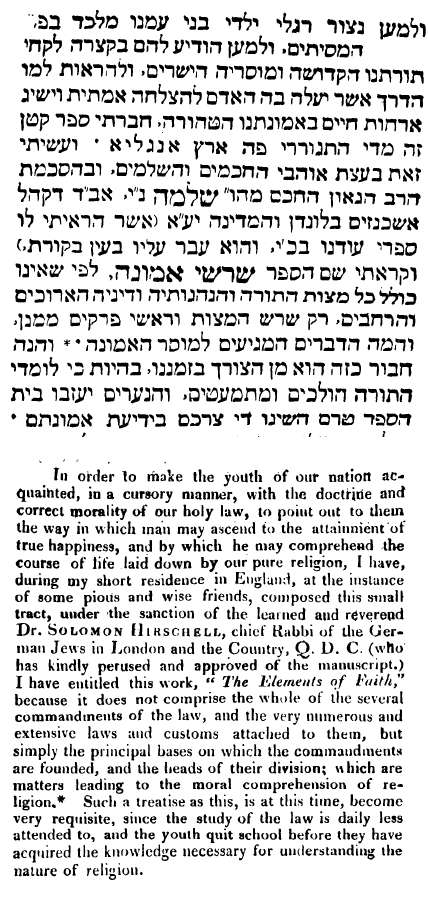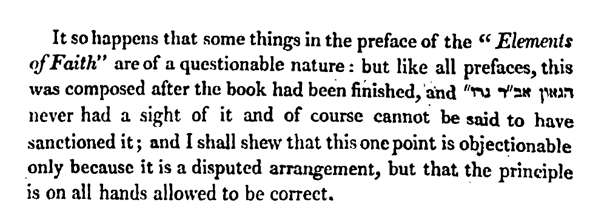
What happened was, R. Tzvi Hirsch's son, the Chief Rabbi of Great Britain from app. 1800 to 1842, known as Solomon Hirschell, noticed one Yom Kippur that a certain wealthy congregant who was a Kohen ascended to recite the priestly blessing, but didn't remove his shoes as required. So Rabbi Solomon did not allow him to duchan. As it happens, this man's custom was to give Rabbi Solomon a present of fish before every shabbat and holiday. Being as Sukkot was only a few days later, Rabbi Solomon assumed that there would be no fish from the congregant this time, because he must have been angry. So he told his wife to purchase fish. However, before Sukkot a package of fish arrived, just as it always did, and along with it was a beautiful little box. Inside the box was a doctor's note assuring that for a certain health issue it would have been dangerous to remove his shoes.
Charles Duschinsky, in his fascinating JQR articles on the Chief Rabbinate of the Great Synagogue, knows the identity of the congregant and brings the story in a slightly different version. In Duschinsky's version, it was Asher Goldschmid, one of the most prominent (you know, rich) members. In this version he is called to an aliya, and then Rabbi Solomon notices he's wearing boots instead of slippers. The rest of the story is identical, and Duschinsky does refer to the passage quoted above, but to my mind this version is more likely to be what actually transpired, for a number of reasons. In addition to knowing about whom the story occurred, presumably a kohen who could not remove his shoes for a medical reason really should not ascend to duchan, so what good is a doctor's note? Whereas there probably is no reason why someone who had to wear boots on Yom Kippur should not receive an aliya while wearing them. The story is not as bad as it may seem at first glance; it shows the rabbi not being afraid to speak truth to power. It also shows Goldschmid to be a class act, both in not getting upset and in also not objecting at the moment (unless of course that part of the story was erased from the official memory).
Duschinsky couples this anecdote with another oral tradition, this one concerning a time when Rabbi Solomon was on the way to synagogue on shabbat wearing his customary white robes (see below). Some bad boys began harassing him, and a Jew who happened to be a boxer dispersed them. Rabbi Solomon grabbed the boxer's arm and escorted him to the synagogue. Later someone told him that it was not right to openly associate with someone who openly does not observe halacha, and he replied "The path of repentance is open to all." Eventually, as such stories generally go, the boxer eventually returned to full observance. Thus we see that Rabbi Solomon had a tolerant disposition.
Indeed, he made an enemy over a petty financial matter concerning a portrait of himself of a very interesting person who wrote an entire book blasting him. One of the chief criticisms of that man, Solomon Bennett, was that Rabbi Solomon gave a haskama to a book that was basically heretical. The book in question was an English translation of the famous maskil Shalom Hacohen's שרשי אמונה, which he and the Sephardic Haham Raphael Meldola (ordained by the Chida) felt was badly needed for the education of the youth who simply had no textbooks, and there were various pressures to use Christian educational tracts. Now, Bennett was not himself particularly orthodox or observant by any means, but that was his criticism of Hirschell.
Here's the "haskama" as it appears in the book, and a reference to it by Shalom Hacohen in his introduction:


The author expresses the urgency of such a book for youths who leave school at a very young age without acquiring the proper understanding of their religion.
Here's the "haskama" as it appears in the book, and a reference to it by Shalom Hacohen in his introduction:


The author expresses the urgency of such a book for youths who leave school at a very young age without acquiring the proper understanding of their religion.
One of Rabbi Solomon's allies wrote a pamphlet in response to Bennett's attack, defending the rabbi's piety, fasts, etc. Take a look at this explanation for the haskama itself:

The response from Bennett was yet another book. This time he complains that the rabbi was tolerant of the chillul shabbos and all manner of sinning on the part of his congregants. For their part, those Jews are highly prejudicial against anyone who "be not orthodox in the extreme," yet they're all a bunch of mechalelei shabbos be-farhesya. Now, Rabbi Solomon was a fabulous seforim and manuscript collector. So as for the rabbi, all he does is buy books so he can show off his library and impress the am haratzim. And the pamphlet written against him? That was by someone hired to "ruminate the library of the Medrash" of the Portuguese Synagogue and come up with a response. Isn't that interesting?

The response from Bennett was yet another book. This time he complains that the rabbi was tolerant of the chillul shabbos and all manner of sinning on the part of his congregants. For their part, those Jews are highly prejudicial against anyone who "be not orthodox in the extreme," yet they're all a bunch of mechalelei shabbos be-farhesya. Now, Rabbi Solomon was a fabulous seforim and manuscript collector. So as for the rabbi, all he does is buy books so he can show off his library and impress the am haratzim. And the pamphlet written against him? That was by someone hired to "ruminate the library of the Medrash" of the Portuguese Synagogue and come up with a response. Isn't that interesting?
This portrait of Rabbi Solomon Hirschel was printed in the European Magazine and London Review, March 1811. He was then 50 years old and dressed in what I assume, in light of the boxer story, was his white shabbos finery:

Speaking of fur hats, Duschinsky published many letters by R. David Tevele Schiff, Rabbi Solomon's predecessor. In one of from 1782 them he asks his brother to send him a half dozen plain white hats (ניט גישטרייפט ניט אייניגה קולעהר רק פשוט וויס) but not sable (וגם קיין צאביל קאפין), which D. interprets as a joke.
Incidentally, Duschinsky's articles contain some genealogical data which show just how, well, tight the European rabbinic elite was.
One of Solomon Hirschel's daughters was married to R. Shlomo Eger's son, making her a granddaughter in marriage of R. Akiva Eger. R. Akiva Eger's daughter was married to the Chasam Sofer. The Chasam Sofer's rebbe, R. Nosson Adler, was the great-uncle of R. Nathan Marcus Adler, Solomon Hirschel's successor. R. Nosson Adler's rebbe, R. David Tevele Schiff was Solomon Hirschel's predecessor, and he was also Nathan Marcus Adler's great-uncle. And of course Solomon Hirschel's great-uncle was R. Yaakov Emden, making him and the Chacham Tzvi, his father, and all their relations relatives as well. One of Rabbi Solomon's sons, David Tevele Berliner, settled in Jerusalem where he became a hot shot with the Kehillas Perushim so one imagines that the marriage ties ultimately extended to the rabbinic elite in the Holy Land as well. In short, it was a small rabbinic world.
